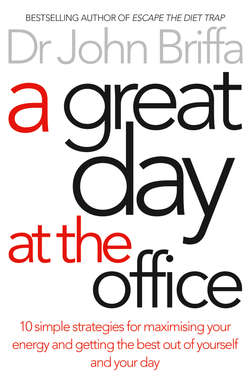Читать книгу A Great Day at the Office: 10 Simple Strategies for Maximizing Your Energy and Getting the Best Out of Yourself and Your Day - Dr. Briffa John - Страница 37
Appetite for Change
ОглавлениеTheoretically, a diet lower in sugar and starchy carbohydrate might help control our appetite because of its ability to guard against blood sugar lows that can cause hunger and food cravings. Also, lower-carb diets tend to be richer in protein which, calorie for calorie, has been found to be more satiating than either carbohydrate or fat.23–25
Another proposed mechanism for the ability of relatively low-carbohydrate diets to quell appetite concerns their impact on insulin. Low-carb diets help to lower insulin levels that facilitates fat loss. When fat is lost, where does it go, though? The answer is that it makes its way into the bloodstream, via which it can be transported to our tissues, including the muscles. Here, it can be taken up into the muscle cells and be metabolized for energy.
In this way, then, the body is using stored fat as ‘food’ (that is what it’s there for, after all). The ability to utilize stored fat efficiently may reduce hunger because the body isn’t actually ‘starving’. Like a hibernating bear, the body is now living happily off its stored fat, just as it’s designed to do. This state, though, is nigh impossible to achieve with a standard ‘carb-fuelled’ diet, but is facilitated by one that lowers insulin levels.
Satisfaction Guaranteed
The ability of protein-rich, fat-rich, lower-carbohydrate diets to sate the appetite was well demonstrated in a study of obese men.26 At the beginning of the study, men ate a low-fat, high-carbohydrate diet designed to maintain a stable weight (about 3,000 calories a day on average).
Then, on separate occasions, the volunteers ate two different diets, each for a period of a month. Both diets were protein-rich (30 per cent of calories) but differed in terms of the amount of carbohydrate and fat they contained. In one of the diets, 35 per cent of calories were contributed by carbohydrate (moderate carbohydrate and moderate fat) while in the other just 4 per cent of calories came from carbohydrate (low carbohydrate and high fat).
The test diets were ‘ad libitum’ in nature, which means that the men were allowed to eat as much of them as they liked.
One of the most notable things about this study was that when men switched to either of the protein-rich test diets, they naturally ate less than the amount of food calculated to maintain a stable weight. Actually, they ate about 40 per cent fewer calories, despite having no restriction placed on the amount they were allowed to eat. This finding supports the idea that relatively protein-rich diets have generally superior appetite-sating properties.
However, there were differences noted between the two test diets as well. On the low-carbohydrate, higher-fat diet, hunger levels were lower compared to a medium-carbohydrate, lower-fat diet, and about 150 fewer calories were consumed on average, too.
What this study shows is that emphasizing protein in the diet can lead to a spontaneous reduction in food intake, and this effect is even more potent when the diet is low in carbohydrate and rich in fat.
Other research has assessed the appetite-quelling effects of diets based on natural, unprocessed foods. For example, in one study, men were asked to eat either a diet based on ‘primal’ foods or a ‘Mediterranean’ diet for a period of twelve weeks.27 The primal diet emphasized meat, fish, fruit, vegetables, eggs and nuts. The Mediterranean diet was based on wholegrains, low-fat dairy products, vegetables, fruit, fish, vegetable oils and margarine. Both diets were ad libitum.
Those eating the Mediterranean diet ate an average of over 1,800 calories per day to satisfy themselves properly. On the other hand, the ‘primal eaters’ were satisfied with significantly less (under 1,400 calories a day). This is evidence that a diet based on natural, unprocessed, nutritious foods really does have the capacity to satisfy and promote weight loss without hunger.
The fundamental ability of lower-carb diets to quell the appetite naturally and allow individuals to eat less without hunger makes them generally effective for the purposes of weight loss. Nevertheless, conventional advice is for us to avoid eating in this way, lest it jeopardizes our health. In particular, this sort of diet is said to load us up with ‘artery-clogging saturated fat’. The idea that saturated fat is bad for us is generally accepted as fact. But where did this idea come from, and is it actually based on sound evidence?
